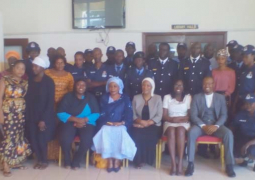It is very positive to see such widely publicised intentions on the part of the government and our sub- regional partners in ECOWAS to tackle the scourge of human trafficking.
The Attorney General and Secretary of State for Justice, Marie Saine-Firdaus, did bemoan the fact that though the trafficking of people is a global problem, its economic and social impact on fragile, transitional and developing third world countries is devastating and that the problem cannot be effectively combatted as individual nations. This is absolutely correct. The traffickers do not recognise borders, so we must adopt a unified cross-border approach to tackling them and ending the suffering of their victims.
There is no doubting the sophistication of many of these operations and this makes our task a very difficult one.
Secy. Saine-Firdaus highlighted this very fact at the recent three-day ECOWAS meeting on the implementation of the ECOWAS Plan of Action to combat trafficking in persons. She said: "Human traffickers use different types of operations, multiple financial transactions, and numerous instruments through several intermediaries to beat the system. These sophisticated techniques and processes are employed by these criminals to purposely conceal the illicit nature of their activities and origins of their wealth, a wealth often used to perpetrate their criminal activities."
Of course there are also some very unprofessional and amateur operations involved in this kind of activity. In many cases young men from The Gambia and the sub region will attempt to reach Europe in small, un-seaworthy and uncovered boats. This kind of activity is easier to prevent than the more sophisticated kinds and as such must be our number one priority.
The recent meeting brought together experts within the ECOWAS sub-region. Among other things it was geared towards assessing the level of implementation of the ECOWAS Plan of Action; the successes registered and the problems and challenges, with a view to preparing and improving on common strategies and finding common solutions to a common problem. This is all very positive and will hopefully prove very fruitful in the context of our ongoing struggle. We must remember however that governments are only one of the stakeholders in this battle. The people of The Gambia also have a role to play. We must ask where the young men get the vast sums of money they pay to the traffickers? Are they being supported in their decision by members of their families or communities who hope that remittances will flow if their [often deadly] quest is successful? Are there people within our communities who are aware of this kind of activity but who have not notified the relevant authorities? All these questions must be answered if we are to have a full grasp on the scale of the problem we are facing.
One major area where the government can intervene to help tackle the problem is the creation of an economic environment that won't make people feel they have to leave to prosper. This, as much as any regional strategy, will stem the numbers seeking the services of the traffickers. In any business, legal or illegal, the market dictates. If there is no demand there will be no traffickers.
We are making progress on this issue but we must never relent in our fight. Together with our partners in the sub-region and our citizens here at home we must battle on until this terrible scourge is a dim and terrible memory.
"Crime expands according to our willingness to put up with it."
Barry Farber


